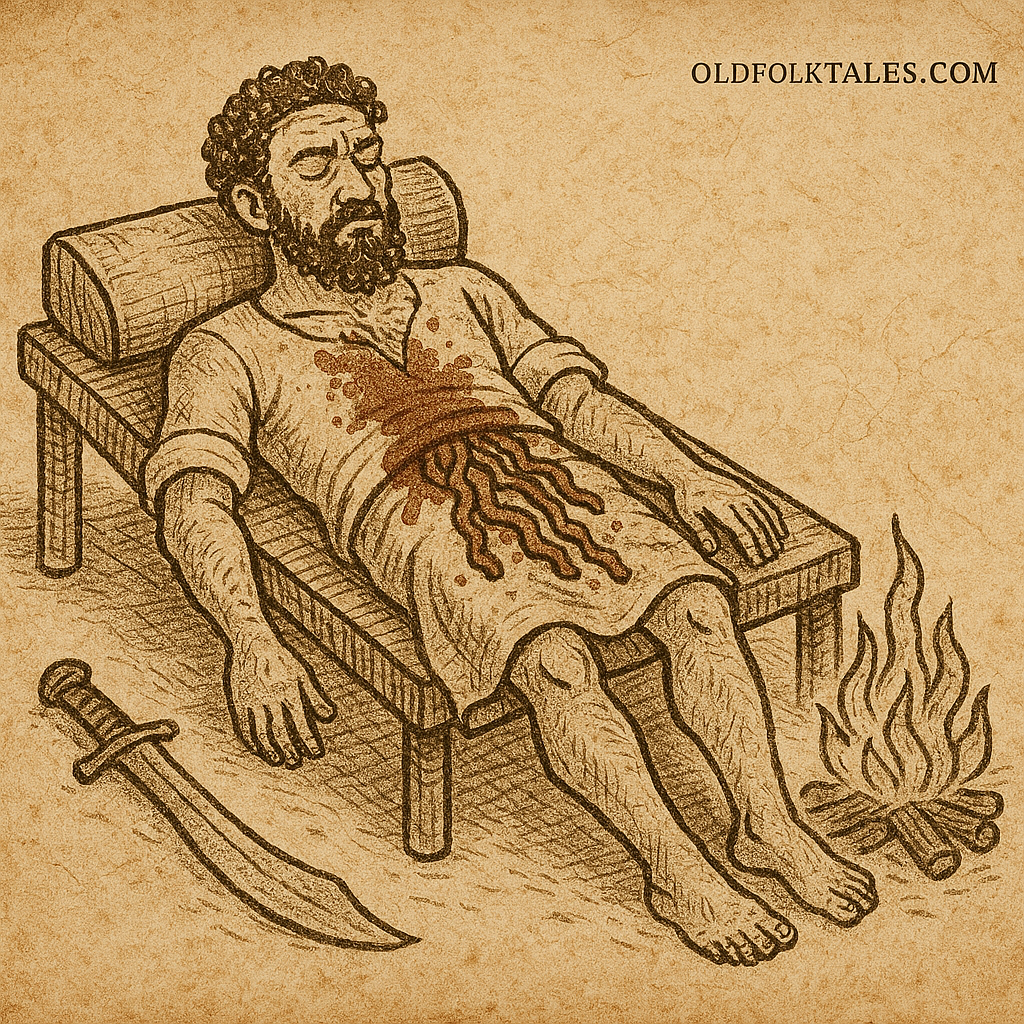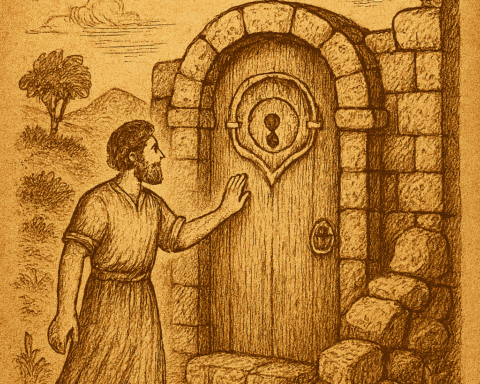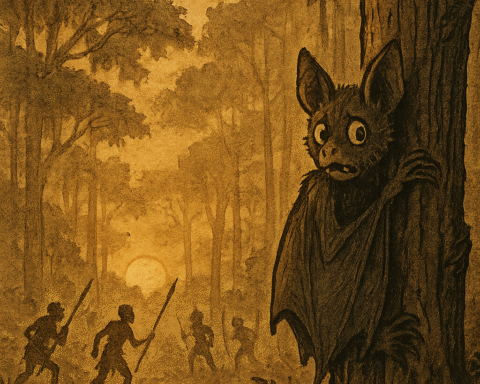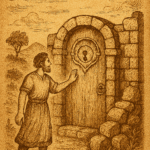In a village nestled among rolling hills where the sound of grinding stones echoed through compound walls and children’s laughter mingled with the bleating of goats, there lived a man named Agha who possessed two wives but understood neither of them truly. His household, like many in that time, was divided by the complex dynamics of polygamy, where love and jealousy danced together like shadows at sunset.
Masafi, his first wife, was known throughout the village as a woman whose tongue moved faster than a weaver’s shuttle. Every evening when Agha returned from his daily labors, she would greet him not with water to wash his dusty feet, but with a torrent of complaints that flowed like an unending stream. Her voice would rise above the cooking fires as she launched into her familiar litany against her co-wife.
“Ajientoh is a bad wife,” she would begin, her eyes flashing with righteous indignation. “She isn’t a good cook, her soup tastes like water mixed with disappointment. Ajientoh’s children always bully and beat up my children when we’re not watching. She’s selfish, keeping the best pieces of meat for her own family. And lazy! You should see how she spends all day at the river, scrubbing her feet instead of working.”
Also read: The Secret Keeper’s Doom
These poisonous words fell upon willing ears, for Agha had long ago chosen his favorite between his two wives. His love for Masafi burned so intensely that he would boast to anyone who would listen about the lengths he would go to prove his devotion. “I could kill a lion for her,” he would declare, pounding his chest with pride. “I’d even do something as unlawful as laying the head of that lion at her feet.” Such was his infatuation that he remained blind to Masafi’s manipulative nature and deaf to the wisdom that might have shown him her true character.
Ajientoh, meanwhile, moved through her daily existence like a quiet river flowing around stones. Where Masafi’s presence filled every corner with noise and drama, Ajientoh brought a calm steadiness that went largely unnoticed and unappreciated. She rose before dawn to kindle the cooking fires, tended to her children with patient care, performed her household duties without complaint, and bore her co-wife’s endless insults with the dignity of a woman who understood that actions spoke louder than accusations. Never did she burden her husband with tales of Masafi’s cruelty or seek his sympathy for the daily torments she endured.
One morning, as the dry season painted the landscape in shades of gold and brown, Agha awoke with a darkness clouding his mind like storm clouds gathering on the horizon. He claimed that troubling dreams had visited him in the night visions that revealed his wives’ hearts as false and their love as mere pretense. The seed of suspicion, once planted, grew rapidly in the fertile soil of his paranoid thoughts.
“I must test them,” he muttered to himself as his wives departed early for their farms, bent beneath the weight of farming tools and empty baskets that would return heavy with the harvest. “Only through a trial can I discover which of my wives truly loves me.”
As the sun climbed higher and the compound settled into the quiet rhythm of midday, Agha set his cruel plan in motion. He spent the morning hours repairing a hole in the goat pen, his hands working mechanically while his mind churned with deceptive schemes. When evening shadows began to stretch across the nsaa like reaching fingers, he selected one of his finest goats and led it to slaughter.
The preparation was methodical and grotesque. After draining the animal’s lifeblood, Agha carefully removed the intestines, handling them like props in some macabre theater performance. He positioned himself on his bamboo bed beside the fireside, arranging the bloody entrails across his bare stomach with the attention to detail of an artist creating a masterpiece. Goat’s blood, still warm and thick, was smeared across his chest and throat until he resembled a victim of savage violence. Finally, he placed the blood-stained cutlass on the floor beside his bed and composed himself in the stillness of feigned death.
As twilight painted the sky in shades of purple and gold, the sound of returning footsteps and children’s voices announced the wives’ homecoming. They arrived dust-covered and weary from their day in the fields, their backs bent under heavy loads of groundnuts, corn, and cocoyams that represented their family’s prosperity for the coming months.
Masafi, ever eager to be first in her husband’s attention, rushed directly to Agha’s house to deliver her customary evening greeting. But the cheerful words died in her throat as she stepped through the doorway and beheld the horrific scene that awaited her. Her husband lay motionless on his bed, his body painted with blood, his intestines spilling from his belly like the aftermath of a brutal attack.
Without so much as a cry of grief or a moment’s hesitation to confirm his condition, Masafi’s thoughts turned immediately to practical matters. She climbed swiftly up a ladder into the smoky darkness of the ceiling storage space, her hands groping expertly through the accumulated treasures hidden there. Her fingers found the precious horns one containing afuondo medicine and another holding her husband’s money along with his valuable ndip and other items of worth.
Like a thief working by moonlight, she gathered these treasures and spirited them away to her own house before disappearing to the stream, her heart apparently unmoved by her husband’s apparent demise.
Meanwhile, Ajientoh had followed her usual evening routine, going first to the stream to bathe and wash away the day’s labor before preparing the family’s evening meal. Only after completing these duties did she approach her husband’s house to announce that supper was ready, carrying herself with the same quiet dignity that marked all her actions.
The house greeted her with the silence of a tomb. In the gathering darkness, she kindled the fire to provide light, and as the flames leaped to life, illuminating the grisly scene, a piercing scream tore from her throat a sound of pure anguish that spoke of a heart truly breaking.
The children, hearing their stepmother’s cries of distress, came running from all directions. Soon the entire compound filled with neighbors drawn by the commotion, their faces etched with concern and horror as they beheld what appeared to be a brutal murder. Ajientoh’s wailing guided them to Agha’s bedside, where they stood in shocked silence.
“What happened to him?” voices whispered in the darkness.
“Oh abomination… Who would do such a thing?” others wondered, though they dared not voice their suspicions aloud.
Murder was as foreign to their peaceful village as snow in the dry season. Such violence challenged everything they understood about their community and the bonds that held civilization together. The sight of so much blood and the apparent savagery of the attack left even the most experienced elders speechless with shock.
Agha’s uncle, as the next senior male in the family hierarchy, began assuming the mantle of leadership that tradition demanded. He started issuing the necessary orders for the cleansing rituals and burial preparations that must follow such a tragedy. But before his directives could be fully given, Agha suddenly leaped from his death bed with theatrical flourish.
The bloody intestines tumbled to the ground, splattering several onlookers with gore. Women screamed in terror, some fled the compound entirely, and others spread word throughout the village that they had witnessed a ghost rising in Agha’s house. The chaos was complete and absolute.
“My brothers! My sisters!” Agha called out, raising his hands to calm the pandemonium. “My people, what you’re seeing are merely the entrails of a goat. When you don’t understand the language of the drum, you say it is noise. Had I not died, I would not have known which of my wives truly loves me.”
The revelation struck the compound like lightning. When Masafi heard these words echoing across the night air, she gathered her belongings with the haste of a woman fleeing justice and disappeared forever to her father’s compound, never to return to face the consequences of her greed and heartlessness.
Agha’s neighbors, meanwhile, turned away from him with expressions of disgust and disappointment. They called him a coward, a man lacking the basic decency expected of a husband and community member. His cruel joke had violated the sacred bonds of trust that held their society together, and forgiveness would not come easily.
To remain in the village and rebuild his shattered reputation, Agha was forced to make elaborate atonement. He purchased five precious jugs of palm wine, cooked two full bunches of plantains, and invited every neighbor to a feast of reconciliation. They ate and drank together, poured libations in front of his house to appease the ancestors he had offended, and only then did the community consider his debt partially paid.
Only Ajientoh, whose genuine grief had revealed the purity of her heart, agreed to remain as his wife, though the trust between them would never fully heal from the wounds of his deception.
Moral Lesson
This tale warns against the dangers of cruel testing in relationships and the wisdom of recognizing true character through daily actions rather than dramatic trials. Agha’s deception revealed not only his wives’ true natures but also his own capacity for manipulation and poor judgment. The story teaches that genuine love is demonstrated through consistent care and loyalty, not through grand gestures or claimed devotion, and that trust once broken through cruel deception may never be fully restored.
Knowledge Check
Q1: What motivated Agha to test his wives in this Cameroon folktale? A1: Agha claimed he had a dream revealing that his wives didn’t truly love him, leading him to devise a cruel test by feigning his own death to see how they would react.
Q2: How did Masafi’s and Ajientoh’s reactions differ when they found Agha apparently dead? A2: Masafi immediately stole his valuables from the ceiling storage without showing grief, while Ajientoh screamed in genuine anguish and called for help from the community.
Q3: What cultural significance does the community’s reaction to Agha’s deception have? A3: The neighbors’ disgust and demand for atonement demonstrates that deceiving one’s family and community about death violates sacred social bonds and requires ritual forgiveness to restore harmony.
Q4: What role does polygamy play in this traditional African story? A4: The story explores the complex dynamics of polygamous marriage, showing how favoritism and jealousy between co-wives can corrupt relationships and cloud a husband’s judgment about his wives’ true characters.
Q5: What is the symbolism of the goat’s intestines and blood in this folktale? A5: The goat’s entrails and blood represent the deceptive nature of appearances and how elaborate lies can be constructed to test others, but ultimately reveal more about the deceiver than the deceived.
Q6: How does this tale reflect African values about community and family relationships? A6: The story emphasizes that genuine love is shown through daily actions and loyalty rather than dramatic displays, and that deception within families affects entire communities, requiring collective forgiveness for healing.
Source: The sacred door and other stories: Cameroon folktales of the Beba,” Ohio University Press.





